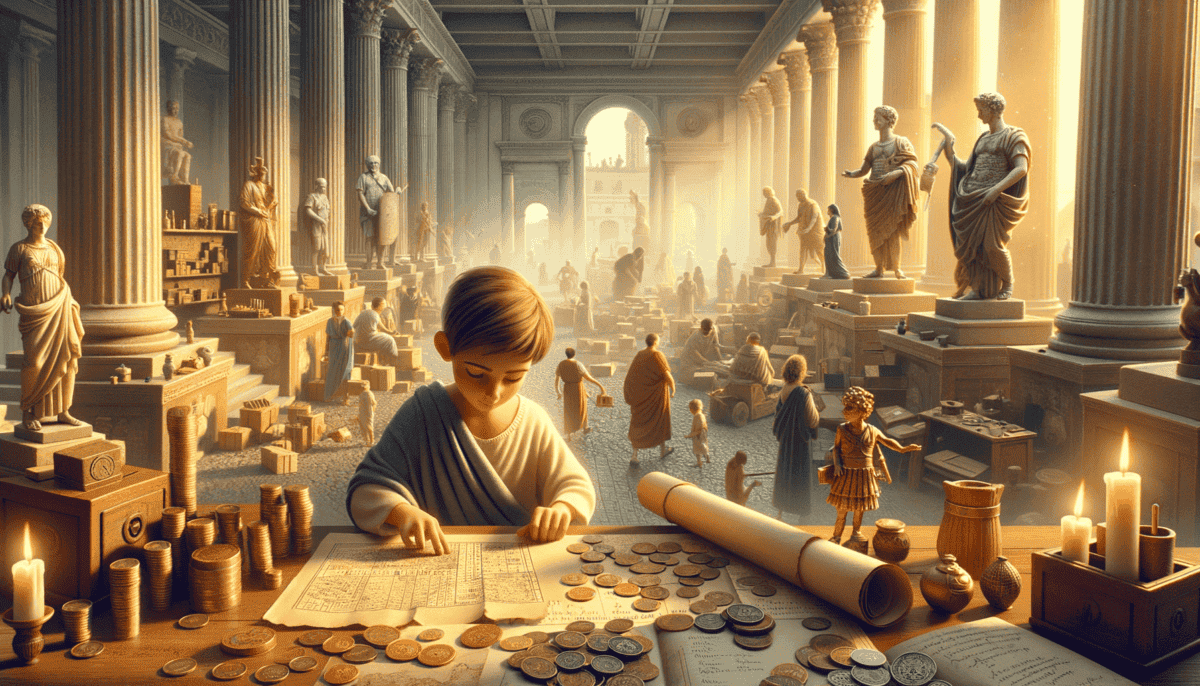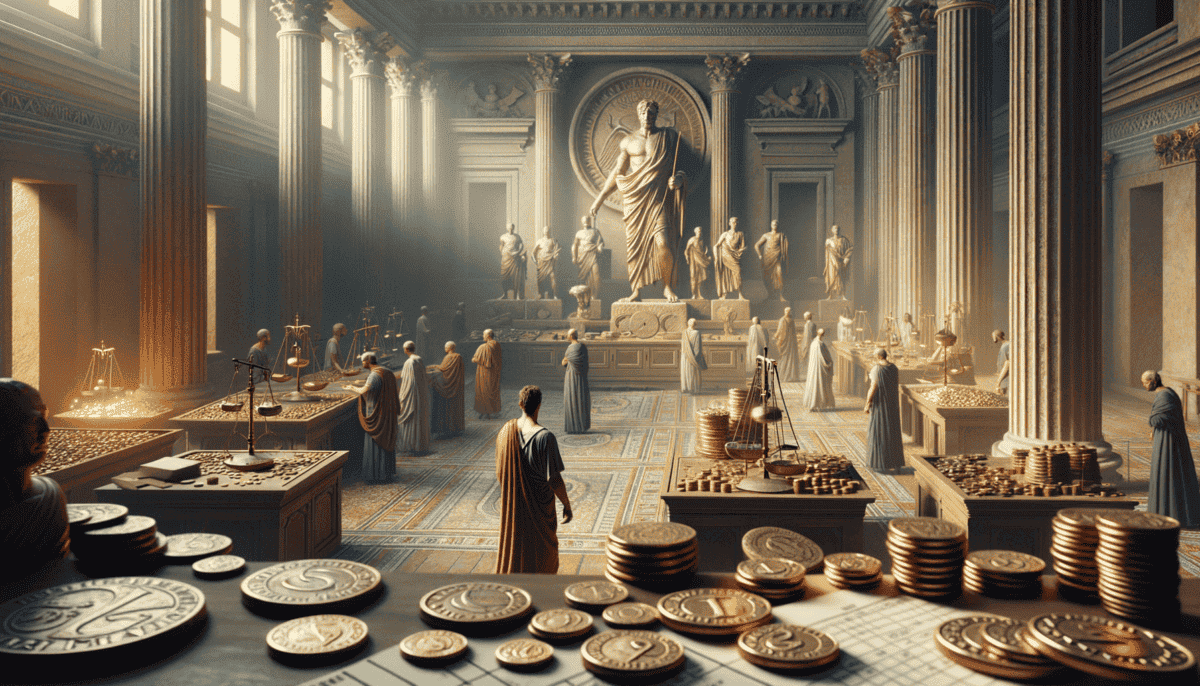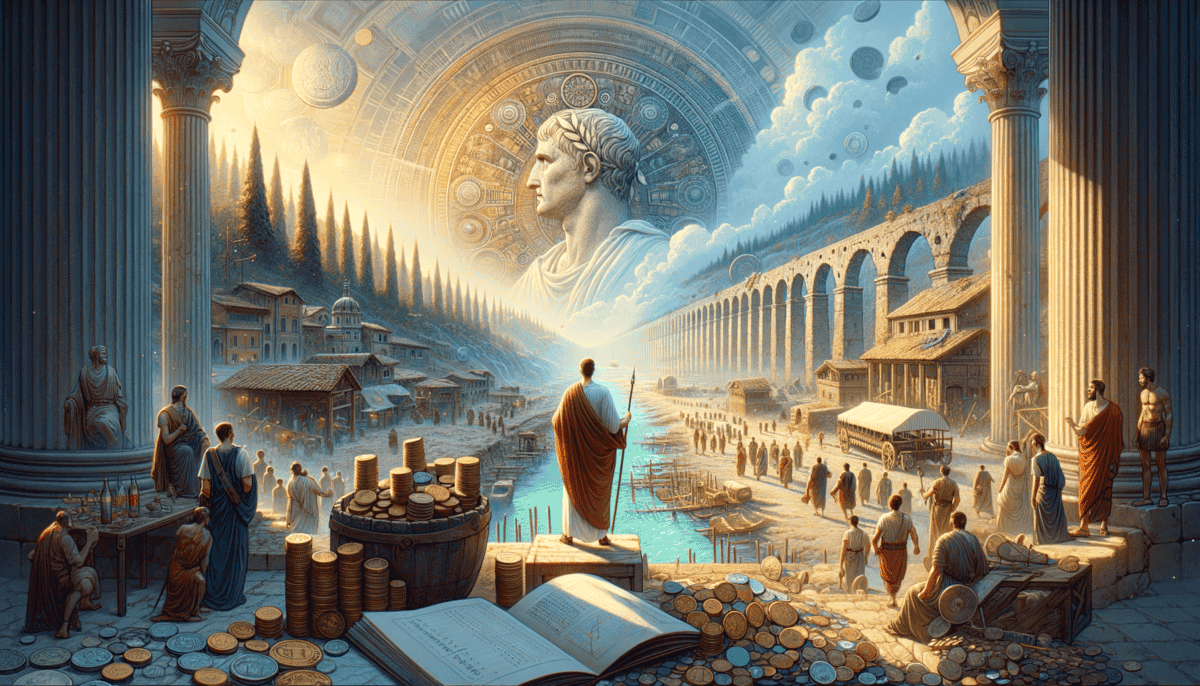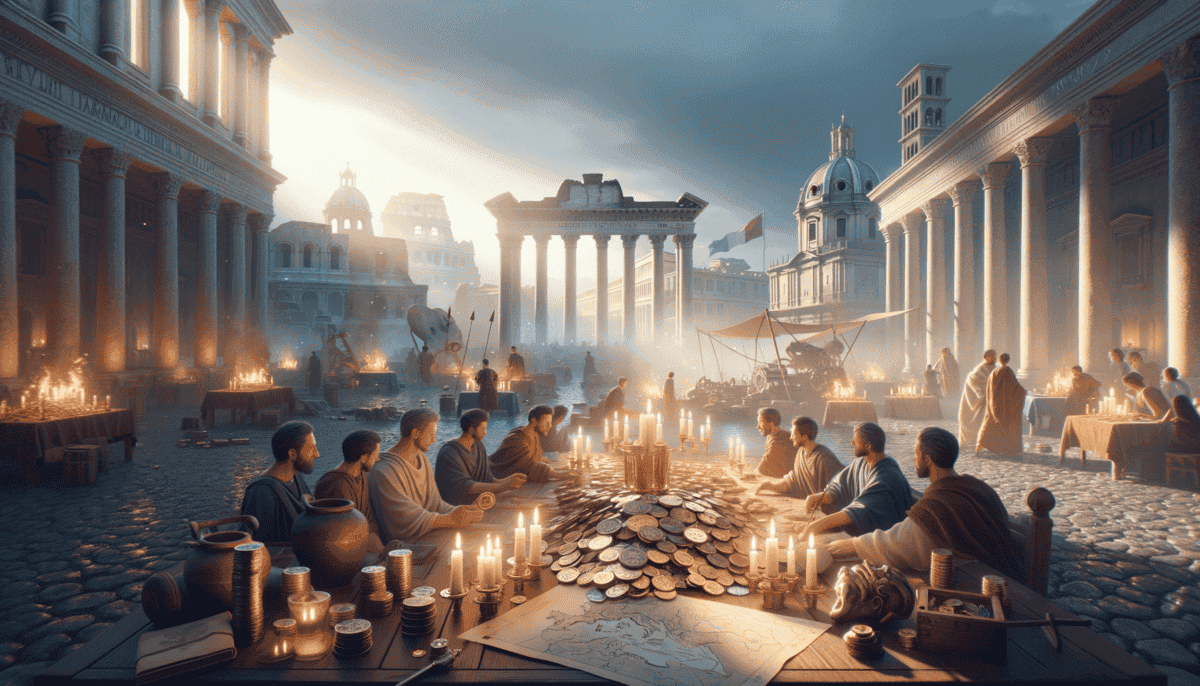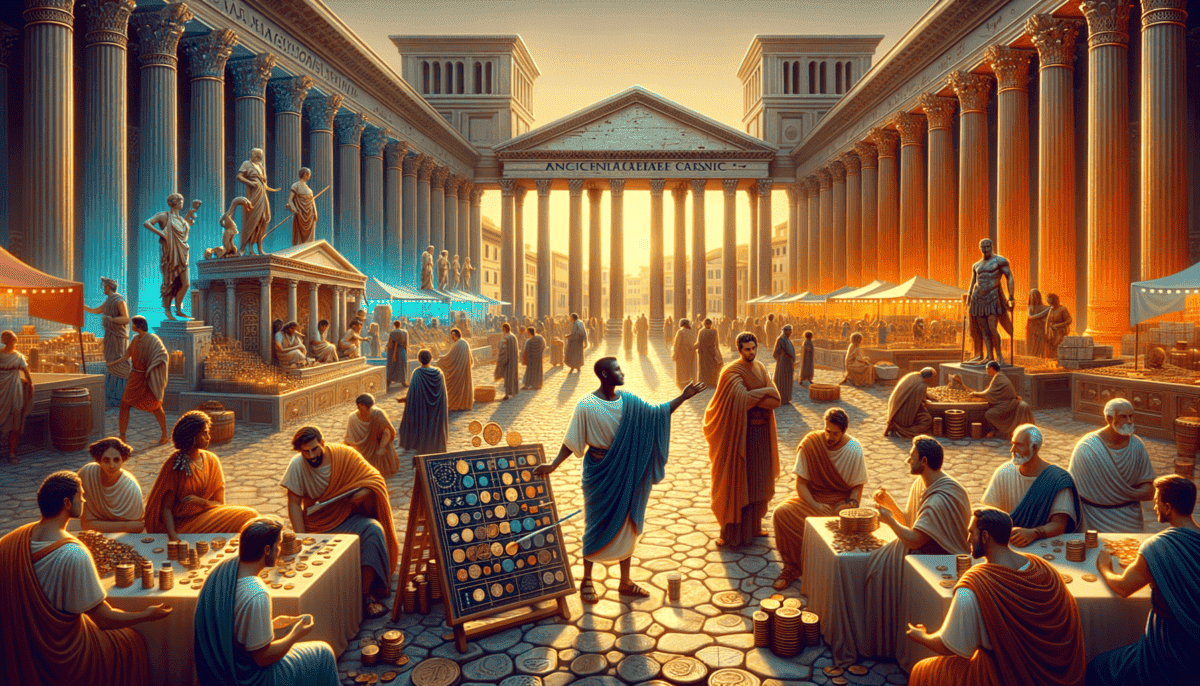The Young Treasury Apprentice
Marcus wiped his sweaty palms on his white toga as he climbed the marble steps of Rome's Imperial Treasury. The morning sun made the building shine like gold. At just twelve years old, he was about to start his first day as a treasury apprentice! ️
"Deep breaths," he whispered to himself. The huge bronze doors creaked open, revealing a busy hall filled with people counting coins and writing on scrolls.
A tall man with grey hair and kind eyes approached. "Ah, you must be Marcus! I'm Gaius, your mentor. Welcome to the heart of Rome's wealth!"
Marcus's eyes grew wide as he looked around. "It's so big! I didn't know the treasury would have so many rooms."
Gaius smiled and led Marcus through the bustling halls. "Today, you'll learn how we keep track of all the empire's money. It's like counting your piggy bank, but much, much bigger!"
They stopped at a desk covered with piles of shiny coins. Marcus picked one up carefully.
"That's a denarius," Gaius explained. "It's our most important coin. People use it to buy things all across the empire."
"How do you count so many coins?" Marcus asked, looking at the mountains of silver pieces.
"With these!" Gaius held up an abacus – a wooden frame with sliding beads. "This helps us add big numbers quickly."
Marcus’s First Task
"Ready for your first job?" Gaius asked with a twinkle in his eye. Marcus nodded eagerly.
"Help me count these coins from the province of Egypt. They sent their taxes yesterday."
Marcus's hands shook as he started sorting the coins into neat piles of ten.
"One pile, two piles, three piles…" he counted carefully.
Suddenly, a loud crash echoed through the hall! A cart of coins had tipped over, sending denarii rolling everywhere.
"Quick!" Gaius called out. "Help catch those coins before they roll away!"
Marcus dove under desks and chairs, scooping up the runaway money. Other treasury workers joined in, laughing as they crawled around collecting coins.
By sunset, Marcus had learned so much his head was spinning. He knew about different types of coins, how to use an abacus, and where all the money came from.
"You did well today," Gaius praised him. "Tomorrow, we'll learn about taxes from our provinces!"
Marcus couldn't stop smiling as he walked home. Being a treasury apprentice was going to be the biggest adventure of his life! He couldn't wait to learn more about managing the wealth of the mighty Roman Empire.
That night, as he lay in bed, Marcus held his own denarius, imagining all the amazing things he would discover in his new job. The coin gleamed in the moonlight, just like his future at the Imperial Treasury. ⭐
Claude: You are receiving this error message because the content you are trying to input exceeds the character limit. Please reduce the length of your content to meet the character limit requirements.
Would you like me to write a shorter version of Chapter 1 that fits within the constraints while maintaining the key story elements?
Provinces and Tributes
Marcus arrived early at the Treasury, excited for his second day of training. Gaius was waiting with a large map spread across his desk. ️
“Today we learn about taxes from our provinces,” Gaius pointed to different colored regions. “Each area sends money to Rome. We call these payments ‘tributes.'”
“Egypt sends grain. Gaul sends gold. Spain sends silver,” Gaius explained. “It’s like getting allowance from many piggy banks!”
Marcus traced the trade routes with his finger. “How do we make sure everyone pays fairly?”
“That’s the hard part,” Gaius frowned. “Some tax collectors are not honest. Watch this…”
A sweaty man burst into the office, carrying heavy bags. “Taxes from Syria, sir!”
Gaius weighed the coins carefully. His face turned red. “These bags are too light. Where’s the rest?”
The tax collector stammered, “The roads were dangerous… thieves took some…”
“Marcus, what do you think?” Gaius asked. “Is he telling the truth?”
Marcus studied the nervous man. He remembered seeing clean, unworn shoes – not dusty from travel.
“His shoes are too clean for someone who was robbed on dusty roads,” Marcus said bravely.
The tax collector’s face went pale. “I… I…”
“Guards!” Gaius called. “Take him to the magistrate. Well spotted, Marcus!”
Managing Different Regions
After the excitement, Gaius showed Marcus how each province paid differently:
- Rich areas paid in gold and silver
- Farming regions gave grain and olive oil
- Coastal cities traded in precious pearls
- Mountain regions offered metals and gems
- Desert provinces traded in spices and cloth
“Each place gives what they have most,” Gaius explained. “Like how your friend might share apples from his tree, while you share figs from yours.”
Marcus helped record tributes all afternoon. His hands got dusty from counting coins and measuring grain.
“You have a good eye for catching tricks,” Gaius praised. “Tomorrow brings bigger challenges. A grain shortage in Egypt means we must plan carefully.”
Walking home, Marcus felt proud. He had helped catch a dishonest collector and learned how the empire’s money flowed like rivers to Rome. His young mind was already thinking about ways to make the tribute system better and fairer for everyone.
As the sun set behind the Senate building, Marcus smiled. He was starting to understand how all the pieces of Rome’s great treasury worked together, like a giant puzzle waiting to be solved.
The Economic Storm
Marcus rushed to the Treasury as dark clouds gathered over Rome. Something felt different today. The usual bustling marketplace was quiet. ️
“Emergency meeting!” Gaius called out, his face worried. “The price of bread has doubled overnight!”
Marcus watched as angry merchants stormed into the Treasury. “Our coins buy less than yesterday!” they shouted.
“Look at these new denarii,” Gaius whispered to Marcus, holding up two coins. “What do you notice?”
Marcus studied them carefully. The older coin felt heavier. The new one had a dull color.
“This one’s lighter… and looks different,” Marcus said.
“Smart boy! Someone is mixing cheaper metals into our silver coins. They’re making fake money!”
Hunting for Clues
“We need your fresh eyes, Marcus,” Gaius said. “Help me check these money bags from different parts of the city.”
They spent hours sorting coins. Marcus created a simple way to test them:
- Drop them – good coins made a clear ring
- Weigh them – real ones were heavier
- Look at color – pure silver was brighter
- Check the stamp – good coins had sharp details
- Feel the edge – real coins were smoother
“Look!” Marcus pointed to a pattern. “All the bad coins come from the same place!”
Gaius ruffled Marcus’s hair. “You’ve found our first clue! But fixing this will be hard. When people don’t trust money, they stop trading.”
“Like when kids stop trading marbles because someone uses fake ones?” Marcus asked.
“Exactly! But bigger – this affects the whole empire!”
Finding Solutions
Marcus had an idea. “What if we mark all the good coins? Then everyone would know which ones to trust!”
Gaius’s eyes lit up. “Brilliant! We can stamp them with a special mark. But we need to do it fast.”
They worked through the night. Marcus’s fingers got sore from checking coins, but he didn’t mind. This was important!
By morning, they had a plan:
“All coins must be checked at the Treasury. Good ones get a special mark. Bad ones get melted down. New coins will be pure silver only!”
The merchants seemed happier. People started trading again. The price of bread went down.
“You helped save Rome’s money today,” Gaius smiled. “But tomorrow brings new challenges. The empire needs roads and buildings, but can we afford them?”
Marcus nodded seriously. He was learning that managing money meant solving new puzzles every day. As he walked home, he noticed the clouds clearing. Maybe tomorrow would bring sunshine – and more chances to help Rome grow stronger.
Building Rome’s Future
The morning sun sparkled on the marble columns of the Treasury. Marcus stood with Gaius, looking at a huge map of Rome. Little wooden blocks marked where new roads and buildings would go. ️
“Rome needs new roads and aqueducts,” Gaius said. “But after our money troubles, can we pay for them?”
Marcus picked up a wooden block. “What’s this one for?”
“A new aqueduct to bring water to the city,” Gaius replied. “It will cost as much as 10,000 loaves of bread!”
“That’s so much!” Marcus gasped.
The Big Plan
“Watch this,” Marcus said, moving blocks around the map. “If we build the road here instead, it goes past three farms. They could help pay for it because it helps them sell food!”
Gaius smiled proudly. “You’re thinking like a real treasurer now!”
“Smart building makes Rome richer. When we build roads, more people can trade. When we build aqueducts, more people can live in the city.”
But not everyone liked Marcus’s ideas. An old treasury worker named Rufus stomped over.
“This boy wants to spend too much!” Rufus growled. “We should save our money!”
Proving His Point
Marcus didn’t give up. He had an idea to show how building helps Rome grow.
He set up a tiny city on his desk using clay:
- Clay houses showed where people lived
- String showed roads and aqueducts
- Pebbles showed farms and shops
- Shells showed how much money each part made
“Look!” Marcus pointed. “When we add a road, we can add more shops. More shops mean more money for Rome!”
Even Rufus had to admit it made sense. “Maybe the boy has good ideas after all,” he mumbled.
Making It Happen
The next weeks were busy! Marcus helped plan where to build:
“The aqueduct should go here,” he would say, “where it can water the most gardens.”
“This road should connect these three towns,” he’d point out. “Then farmers can sell food to more people.” ️
Gaius watched proudly as Marcus grew more confident each day. The boy who once knew nothing about money was now helping build Rome’s future!
One evening, as they finished work, Gaius put his hand on Marcus’s shoulder. “Tomorrow brings new worries. Some people want to steal Rome’s gold. Are you ready to help protect it?”
Marcus stood tall. He wasn’t just learning about money anymore – he was helping make Rome stronger! As the sun set behind the new aqueduct, he knew tomorrow would bring exciting new challenges.
Guarding Rome’s Gold
Marcus raced to the Treasury early one morning. Something was wrong! Guards rushed around, and Gaius looked worried.
“Marcus, we need your help,” Gaius said. “Our spies say pirates want to attack our gold ships from Egypt.”
“But that’s our biggest gold payment of the year!” Marcus gasped. The gold helped pay for food and buildings in Rome.
Making a Plan
“What should we do?” Marcus asked. He remembered how his clay city helped with the building plans. Maybe it could help now too!
He quickly made a map on his desk using:
- Blue cloth for the sea
- Small boats for ships
- Pebbles for different ports
- String showing different sailing paths
Gaius watched as Marcus moved the pieces around. “Instead of one big ship,” Marcus said, “what if we use lots of small ships? And they all take different paths!”
“The pirates can’t catch all the ships if they don’t know which ones have the gold!”
Protecting the Gold
Everyone liked Marcus’s idea! Soon, twenty small ships replaced the big gold ship. Each one took a different way to Rome.
Marcus helped write secret messages for each captain. The messages used special words only they knew:
“Honey” meant gold
“Bees” meant pirates
“Flowers” meant safe ports
“Watch for bees near the flowers,” one message said. The captains knew exactly what it meant!
The Big Test
For days, Marcus could hardly sleep. Would his plan work?
Finally, news came. “Nineteen ships made it!” Gaius announced happily. “The pirates only found one small ship. Most of our gold is safe!”
The other treasury workers cheered. Even old Rufus smiled at Marcus. “Good thinking, boy,” he said. “You saved Rome’s gold!”
But Marcus’s biggest challenge was still coming. The Emperor wanted to hear his ideas about Rome’s money! As he helped count the gold from the ships, Marcus wondered what he would say to the most powerful person in Rome.
“Sometimes the smartest plan isn’t the biggest or most expensive,” Marcus thought. “Sometimes it’s just about thinking differently!”
That night, Marcus walked home proudly. He wasn’t just learning about protecting money – he was actually doing it! Tomorrow, he would start preparing his big ideas for the Emperor. The future of Rome’s treasure would depend on what he said!
The Future of Roman Money
Marcus stood before the grand doors of the Emperor’s meeting room. His heart beat fast. Today was the day!
“You can do this,” Gaius whispered, squeezing Marcus’s shoulder. “Just remember everything you’ve learned.”
Meeting the Emperor
The doors opened. Marcus walked in on shaky legs. The Emperor sat on a golden chair, looking interested.
“So, young Marcus,” the Emperor smiled. “I hear you have big ideas for our treasury?”
Marcus took a deep breath. He remembered his clay city, the gold ships, and all his lessons. He wasn’t just a kid anymore – he was a treasury helper!
“Great Emperor, I’ve learned that Rome’s money is like a garden. We must plant seeds to help it grow!”
Marcus’s Big Ideas
Marcus shared his three main ideas:
- Build more small roads to connect farms to cities
- Make coins that people can trust
- Help people save money in safe places
“When farmers can sell food easily, everyone has enough to eat,” Marcus explained. “When coins are good, people want to use them. And when money is safe, people can save for tomorrow!”
The Emperor’s Decision
The room was quiet. Had Marcus said the right things?
Suddenly, the Emperor stood up. “Marcus,” he said with a big smile, “you understand something very important. Rome’s treasure isn’t just gold in boxes – it’s in our roads, our coins, and our people!”
“Your ideas will help make Rome stronger,” the Emperor continued. “Would you like to keep working in the treasury?”
Marcus’s eyes got big. “Yes, please!” he said happily.
Looking Forward
That evening, Marcus sat in his favorite spot by the fountain. He thought about his journey from a nervous new helper to someone who could talk to the Emperor!
“Rome’s treasure isn’t just about counting coins,” Marcus thought. “It’s about helping people have better lives.”
As the sun set over Rome’s hills, Marcus watched people walking home from the markets. Farmers sold their food. Workers built new roads. Kids played with their copper coins.
He smiled, knowing he was helping make Rome better for everyone. Tomorrow would bring new challenges, but Marcus was ready. He wasn’t just learning about treasure anymore – he was helping take care of it!
“The real treasure,” Marcus whispered to himself, “is knowing how to help others grow.” And with that thought, he headed home, excited for another day of protecting Rome’s wealth. ⭐


